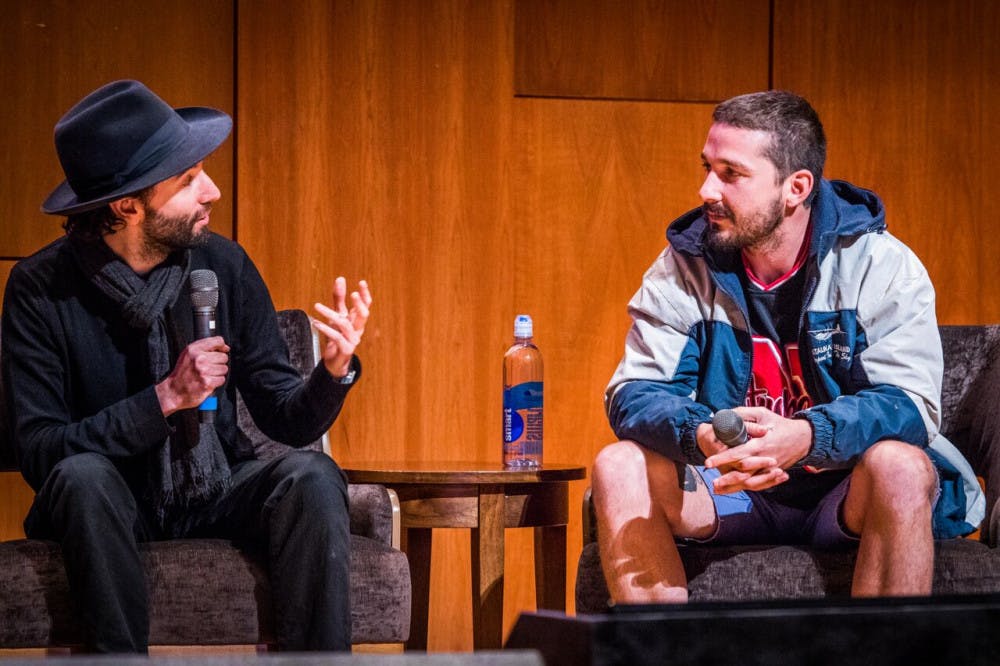Students and community members flocked to Salomon 101 Monday to attend the opening event of the 17th annual Ivy Film Festival, a screening of #TAKEMEANYWHERE, the participatory art piece and short film created by Shia LaBeouf, Luke Turner and Nastja Säde Rönkkö. Following the screening, LaBeouf and Turner took to the stage to answer questions pre-submitted to IFF, as well as those from audience members.
Composed of 95 Brown and Rhode Island School of Design students, the largest student-run film festival in the world is in its biggest year yet, said managing director of IFF Jake Anderson ’18 in the event’s introduction. The 2018 festival features “seven industry guest speakers, five advanced screenings of studio films, a curated selection of 26 student short films, 15 student screenplays and five student virtual reality pieces, representing 25 countries,” Anderson said. The selection of short films will also show at 20 satellite locations across the globe.
The festival’s keynote feature, #TAKEMEANYWHERE, is the product of a month-long project by LaBeouf, Turner and Rönkkö to “hitchhike the internet” during summer of 2016. The trio posted their geographic coordinates online and opened their lives up to strangers to allow them to direct the artists’ adventure. Beginning in Boulder, Colorado, the team traversed the American Southwest, and moved eastward before climbing north and charting the U.S.-Canada border to eventually land in Alaska.
“Each night going to bed … your head would hit the pillow after a long day that was different than the previous day and you’d go to bed thinking anyone could turn up in the morning,” Turner said. “Anything could happen.”
However, LaBeouf noted that the team did not intentionally put themselves in harm’s way along the trip, and could have refused rides they felt were dangerous. “We didn’t encounter any kind of negative energy at all,” LaBeouf added.
Commissioned by the Boulder Museum of Contemporary Art and the Finnish Institute in London, the project originated in response to the theme of “corruption” that was highlighted by the Boulder Museum’s performance art festival, MediaLive, LaBeouf said. But the idea had been on their minds already, with its roots in an earlier work by Rönkkö with the same title in which she rode a horse blindfolded. The artists even looked to Dr. Seuss’ “Oh, the Places You’ll Go!” for inspiration, LaBeouf added. “So, the internet was our horse,” Turner said.
Known for his roles in blockbuster films such as “Transformers” and “Fury,” his time on Disney Channel as Louis on “Even Stevens,” and more recently his pieces of performance and participation art, such as the YouTube sensation, “Just Do It.”, LaBeouf reached out to Turner after discovering his work including his 2011 “The Metamodernism Manifesto,” and the duo met soon after in London. Turner connected LaBeouf with Finnish performance artist Rönkkö — whom he’d known since college — and the trio formed.
“We hatched a plan and two weeks later Shia turns up on the red carpet in Berlin with a paper bag over his head saying “I’m not famous anymore” on it and it became huge,” Turner said. “We never looked back.”
The film is as much a story of their journey — an image of the America they encountered — as it is a collection of the stories of the people they met along the way: One man showed off his collection of sneakers, a woman talks of her short-lived marriage after high school, a group drives from Florida to meet them in Alaska for a matter of minutes before turning back. Later, the film features a conversation between the artists and a man, who, while speeding down the highway, attempts to teach them how to load and shoot a gun. This interaction contrasts with that between the trio and the next group of participants along their journey — a large Mormon family who welcomes them into their home. The film was met with many bouts of laughter, as it depicted the realistic and relatable nature of the journey while it maintained and portrayed the serious essence of the participants’ stories.
“People open up really quickly and talk about the most personal things,” Turner said, and added that “it’s almost like people come to art to experience those things and express them.” This expression “became a kind of theme of the film,” he said.
Participants in the project appear in the film in different ways — some only audibly, some only visually, while others still do not appear at all. “Some people will open up to you only when the camera’s gone, some people see a camera and immediately open up,” LaBeouf said.
All of the participants have remained connected through a Facebook group constructed along the journey, LaBeouf and Turner explained. “Thankfully, this work — perhaps more than others — has this community that’s built around it,” Turner said.
“This is pre-Trump, this is … a different America. So, it was just different, it was just a different landscape. It wasn’t as fired up — as divisive,” LaBeouf said.
In 2016, LaBeouf, Rönkkö and Turner responded to the election results by collaborating on the performance piece hewillnotdivide.us, which invited people to repeat the phrase “he will not divide us” in reference to President Trump. The project began the day of the inauguration at the Museum of the Moving Image in New York, with plans for it to be livestreamed 24 hours a day, seven days a week, for the duration of Trump’s presidency.
“Nobody wants to be cool anymore, but everybody wants to be relevant, and so … there’s nothing more relevant than being here,” Labeouf said. “It’s the biggest student-run film festival and that just feels very, very relevant.”
Correction: An earlier version of this article stated that Shia LaBeouf played Steven in "Even Stevens." In fact, he played Louis in "Even Stevens." The Herald regrets the error.





